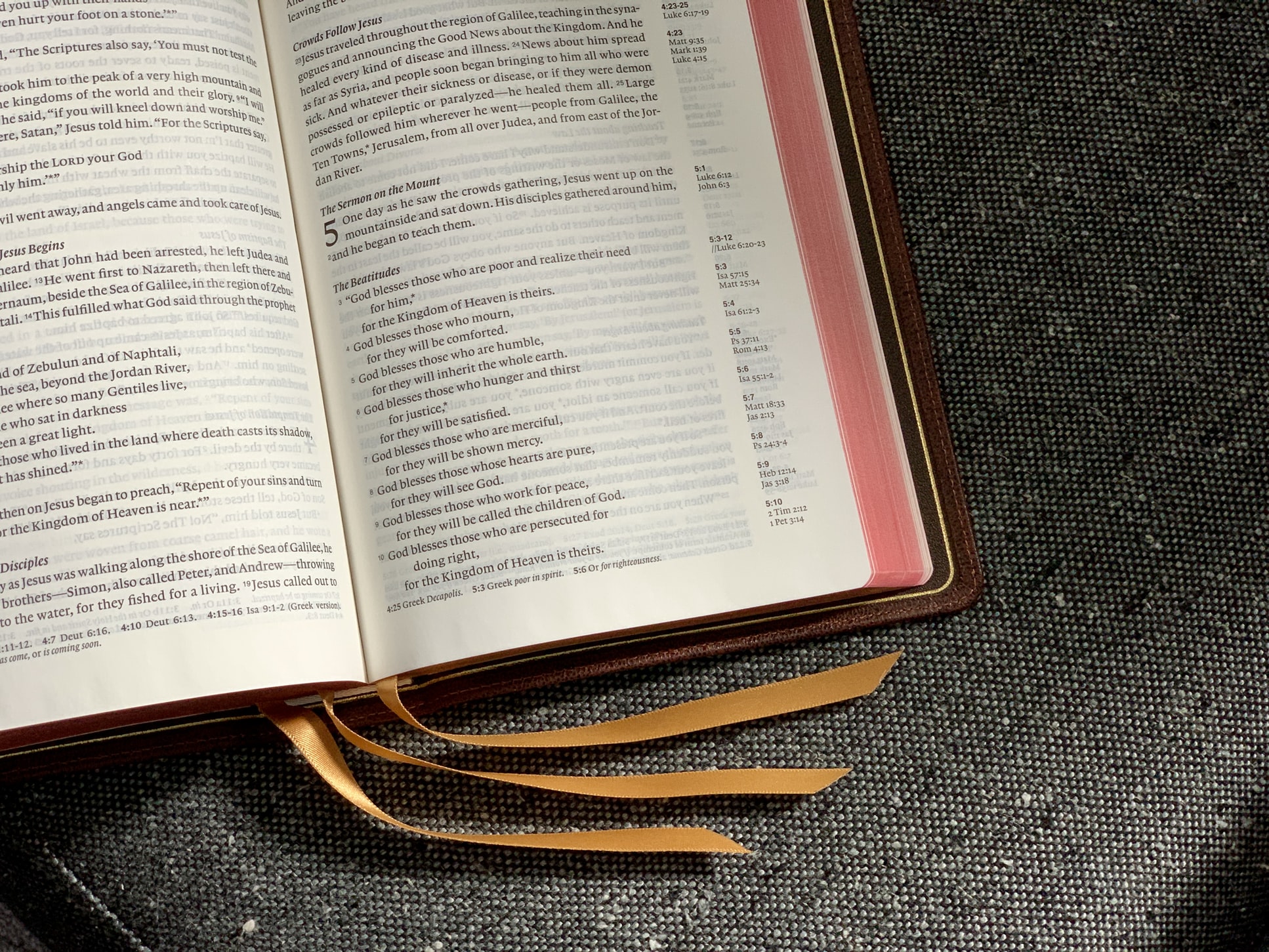
The One Thing You Can Count On as You Lead in 2026
As we pastors step into a new year, we know we don’t control what’s ahead. We can plan, prepare, and pray, but ministry has a way of reminding us quickly that there is never complete or permanent security where people are involved. The future can feel uncertain, not because God is absent, but because we are not in control.One of the marks of emotional and spiritual maturity is coming to terms with that reality. We are not God. We cannot control everything that happens in ministry. Mature faith learns to focus on what God has made us responsible for and to accept without anxiety the things that are beyond our control.There are many things you can’t count on as a new year begins. But there is one thing you can count on: God is in control. Scripture declares, “Everything in the heavens and on earth is yours. . . . You rule over everything” (1 Chronicles 29:11-12 NLT). God’s sovereignty means he remains the ultimate authority. He is in charge. And that truth brings stability in a world—and a ministry—that often feels uncertain.As we look ahead to the rest of 2026, keep these implications of God’s sovereignty in mind as you lead.Implication #1: Because God Is in Control, My Plans Have a LimitEvery new year invites planning. Pastors think about sermon calendars, ministry goals, staffing, and budgets. Planning is wise. Scripture affirms it. But God’s sovereignty reminds us that our plans are never absolute. They always have a limit.The Living Bible paraphrase puts it this way: “We should make plans—counting on God to direct us” (Proverbs 16:9). We make real choices, but we don’t control outcomes. God does. That truth doesn’t make planning unnecessary; it makes it humble. One of the gifts of maturity is recognizing the difference between responsibility and control. We’re called to plan faithfully, but we’re not called to play God.Scripture shows us this balance clearly. God gives us freedom to choose, but our choices operate within his larger purposes. Like a chess match against a grandmaster or a journey on a ship headed toward its destination, we may make many decisions along the way, but the final outcome isn’t in doubt. God is at work accomplishing his will.For pastors, this is freeing news. It means we can plan diligently without carrying the burden of guaranteeing results. We prepare, we lead, and we steward what God places before us, trusting that he remains in control of where the journey ultimately leads.Implication #2: Because God Is in Control, My Problems Have a PurposeWhen problems show up in ministry, our first instinct is often to eliminate them as quickly as possible. We look for solutions, fixes, or explanations. But God’s sovereignty invites us to see problems differently. If God were not in control, our difficulties would be random and meaningless.Because God is sovereign, problems are never random. They are woven into his purposes, even when we don’t yet see how. Life is not a series of disconnected events. History is moving somewhere. God is at work accomplishing his will, not only through moments we would choose, but also through pressures we would rather avoid.This matters deeply for pastors. Ministry brings challenges we didn’t plan for and wouldn’t schedule. Conflict, delay, and disappointment can leave us questioning whether we’ve stepped outside God’s will. But God’s sovereignty assures us that difficulty does not mean detour. He uses problems to shape our character, refine our priorities, and deepen our dependence on him.Knowing that God is in control doesn’t minimize the pain of problems, but it does give them meaning. We don’t have to understand every difficulty to trust that God is at work through them. In his hands, even problems become part of how he forms us and advances his purposes through our ministry. Implication #3: Because God Is in Control, My Prayers Have an ImpactWhen we believe God is truly in control, prayer becomes more than a last resort. It becomes our first response. Prayer matters not because of our words or persistence, but because of who we’re praying to. If God were distant or indifferent, prayer would be little more than wishful thinking. But if God is sovereign, prayer is participation in his work.God’s control does not make prayer unnecessary. It makes prayer meaningful. He invites us to bring our concerns, our needs, and our hopes to him because he is already at work and chooses to involve us. Prayer is one of the ways God aligns our hearts with what he is doing in the world and in our ministry.For pastors, this is especially encouraging. We often pray about things we cannot fix, change, or fully understand. We pray for people whose lives feel fragile. We pray for direction when decisions feel unclear. Trusting God’s sovereignty reminds us that prayer is never wasted. It places us in step with the one who is already moving.As this year continues, prayer anchors us not in outcomes we can’t control, but in the God who can be trusted completely.As the year unfolds, many things will remain uncertain. Plans will change. Problems will arise. The future will still be unknown. But the one thing you can count on hasn’t changed. God is in control. That truth steadies us when ministry feels unpredictable and reminds us we’re never leading alone.
The One Thing You Can Count On as You Lead in 2026

What to Do When You Feel Taken for Granted
Pastor, it doesn’t take long in ministry to realize that people have short memories. One day you’re leading someone to Christ; the next day they’ve left for the new church down the street. One Sunday someone tells you they loved the sermon; by midweek they can’t remember what it was about. After a while, you can start to feel invisible—taken for granted.That experience isn’t new. The Israelites had a short memory when it came to Moses. Just three days after the Red Sea miracle—at the very first sign of trouble—they started doubting his leadership. If that happened to Moses, it can certainly happen to you.We live in a what‑have‑you‑done‑for‑me‑lately world. Children forget what their parents have done for them. Bosses forget what their employees have done for them. Spouses take each other for granted. And people in your church can forget your love and sacrifice too.So what do you do when you feel taken for granted in ministry? Moses gives a great example of what to do with your hurt.1. Don’t curse it.When Moses heard the Israelites grumble, it would have been natural to respond in anger. Most of us would have done that. But Moses didn’t. Revenge just wasn’t an option.When people don’t appreciate you, choose not to strike back. Leave your frustration in God’s hands. When you let God settle the score, you are well represented. “Bless those who persecute you; bless and do not curse” (Romans 12:14 NASB).Instead of cursing those who forget you, speak positively about them. Ask God to bless them, even when they’ve hurt you.2. Don’t rehearse it.Every time you review the hurt you feel when you’ve been taken for granted, it gets bigger. If you’ve served someone selflessly and then they criticize you, it hurts. But if you’re not careful, that hurt will quickly grow out of proportion.Notice that Moses never kept going back over the pain. He focused on the future. Rehearsing pain is a dangerous habit in ministry because soon you’re addicted to it. I’ve met some very bitter pastors who allowed experiences of their past to color their perception until they thought everybody was against them. You can’t allow that to happen.3. Don’t nurse it.Don’t allow yourself to hold a private pity party. It’s okay to be angry for a moment. Anger is a legitimate response to hurt. But holding on to anger becomes sin. “Don’t get so angry that you sin. Don’t go to bed angry, and don’t give the devil a chance” (Ephesians 4:26–27 CEV).If you are a leader, you can expect to be misunderstood. It’s a fact of leadership. If you choose not to take the disappointment personally, you’ll avoid becoming cynical.What to Do Instead When You Feel ForgottenSo, what should you do when you feel forgotten and taken for granted? Moses and Joseph in the Old Testament show us a better way.First, share your pain with God.Often we go to the wrong people with our pain. We go to the people who’ve mistreated us and remind them of their oversight—or we complain to others and spread our hurt. Instead, take your pain to God. He can take whatever you dish out to him. He understands what it feels like to be rejected and forgotten.Pour out your frustration honestly in prayer. Tell God exactly how you feel. He already knows anyway.Second, expect God to reverse your disappointment.God is the master of reversing hurts. Remember the story of Joseph in the Old Testament? Joseph’s brothers sold him into slavery. Then, 20 years later, he was able to say, “You intended to harm me, but God intended it for good to accomplish what is now being done, the saving of many lives” (Genesis 50:20 NIV).Joseph had every reason to be cynical. His own family had sold him out. But he wasn’t cynical. He trusted that God was working for good behind the scenes.Moses had a similar experience. The people had been whining and complaining because they didn’t have water—and when they did get water, it was bitter. But where did God lead them after that? He led them to a place of abundant water. God reversed the situation and showed his goodness.Pastor, God can do the same with the way you’ve been treated in ministry. What others forget, God remembers. What others overlook, God will one day honor.Friend, I don’t know how you’ve been taken for granted in ministry. But I do know this: God has not forgotten you. He’s seen every act of service. He’s watched every time you’ve faithfully prepared a message. He has walked into the room of the dying person with you. He’s listened as you’ve prayed for the direction of your church. He’s seen your secret acts of service.Others may take you for granted, but God doesn’t. And in the end, his “Well done” is the only approval that really matters.
What to Do When You Feel Taken for Granted

How to Lead Faithfully in God’s Waiting Room
Every pastor will spend time in God’s waiting room. You pray for a breakthrough—a stronger team, a new building, spiritual renewal—and nothing seems to move. You wonder, “God, why the delay?”If that’s where you are, take heart: A delay is not a denial.God’s timing is perfect. He’s never early, never late, and always right on schedule. In the Living Bible paraphrase, God says, “These things I plan won’t happen right away. Slowly, steadily, surely, the time approaches when the vision will be fulfilled. If it seems slow, do not despair. . . . They will not be overdue a single day” (Habakkuk 2:3).God may not fulfill your vision immediately because he’s doing something bigger than you can see. While you’re waiting, he’s working—arranging circumstances, shaping your character, and preparing the blessings he intends to give.God’s Waiting Room Is a ClassroomEvery delay in your life is a test of your faith. “So Abraham received what God promised because he waited patiently for it ” (Hebrews 6:15 GW). The waiting revealed the kind of faith Abraham had—and God does the same with us.In the early years of Saddleback Church, I learned this lesson firsthand. For 15 years we met in borrowed buildings—79 different ones—before we ever built a permanent facility. More than 10,000 people were attending before we broke ground on our first building. Every setback was another opportunity to trust God’s timing rather than my own.I once thought the waiting was about property and permits, but God was after something deeper. He wanted to build people before buildings. He wanted to develop faith before foundations. Looking back, I can see that the delays strengthened our church far more than instant success ever would have.While You’re Waiting, God Is WorkingGod doesn’t waste delays. They’re not wasted time—they’re training time. The same God who made you a promise is shaping you into the kind of person who can handle its fulfillment.You may be waiting for growth in your congregation, for unity in your leadership, for revival in your city, or even for personal renewal in your own soul. Whatever the wait looks like, remember: God is never in a hurry, but he’s always on time.“Be still in the presence of the LORD, and wait patiently for him to act” (Psalm 37:7 NLT). When you learn to trust God’s pace, you discover that the waiting is not punishment—it’s preparation.Don’t Waste the WaitingWaiting doesn’t mean doing nothing. Keep praying, keep serving, keep believing. Use the delay to deepen your roots. While you’re waiting for God to act around you, let him work within you.Moses spent 40 years in the desert before leading Israel out of Egypt. Joseph spent years in prison before fulfilling his dream. Even Jesus spent 30 years in preparation for three years of ministry. Waiting time is never wasted time when God is involved.God’s Delays Have a PurposeYou may not understand why God seems to be taking his time. But you can be sure of this: He’s weaving every detail together for his glory and your growth. What looks like a delay may be God’s way of preparing you for something far better than you imagined.At Saddleback, I saw God turn disappointment into direction, change closed doors into new opportunities, and grow long seasons of waiting into testimonies of his perfect timing. The same God who guided us will guide you.So if you’re in God’s waiting room today, don’t lose heart. Don’t waste the waiting. Let God use it to stretch your faith, shape your character, and strengthen your ministry. He’s never late, and when the time is right, the vision he’s placed in your heart will come to pass—right on schedule.
How to Lead Faithfully in God’s Waiting Room

Five Ways to Slow Down Before You Burn Out
There have been times when I thought I was too busy to take time off. It never worked.You don’t have to be a prophet to know that technology has made three things happen in the world: It has made the world smaller, more complex, and faster. You live a much faster lifestyle than your parents did. Your children will live an even faster lifestyle than you do.As you and I know, pastors aren’t immune to these time pressures. With meetings, ever-shrinking sermon preparation time, and a crowded pastoral care schedule, our office calendars can stay full if we’re not careful. Then we get home and rush our kids to after-school events, grab a quick dinner, run to the hospital, go home, jump in bed, and hope there are no late-night phone calls.We can identify with what a USA Today article once said about life for many people: “Today people are souped up, stressed out, and overscheduled. In this brave new world, boundaries between work and family are disappearing. Everybody is mobile, and every moment is scheduled.”The Bible tells us that hurry, worry, and scurry have dramatic negative effects on our lives and ministries. If you’re serious about slowing your life down to a more humane pace, you’re going to have to make five countercultural changes to your lifestyle.1. Learn contentment. It starts in the heart. Paul says this about contentment: “I have learned the secret of being content in any and every situation” (Philippians 4:12 NIV). Contentment isn’t part of human nature—for pastors or for anyone else! We want life to be different—better. But we can’t slow down our lives unless we start being content with what we have.Contentment doesn’t mean you don’t want your church to grow. It doesn’t mean you don’t go after your God-given vision for your church. It just means a bigger church won’t make you any happier. Your relationship with Christ is where you find your true joy. Until you come to that conclusion, you won’t slow down.2. Obey the fourth commandment. Most of us would bristle if we were told that we were consistently breaking the Ten Commandments. But, pastor, many of us are. Remember the fourth commandment? We're supposed to take one day off every week. Are you doing that? For most of us, that’s not Sunday. We’re preaching, meeting with people, and overseeing worship services—we’re not resting. It doesn’t matter which day it is, but we need a day off.During the times that I’ve worked constantly—without taking time off—things always just got worse. I became more irritated with my family. I became more tired. And I didn’t get as much done. It was so prideful of me to think that what I was doing at that moment was more important than listening to what God said about how he made me.I know a pastor who had a church member get mad at him because he tried to call him several times on Monday and couldn’t get ahold of him. The pastor said, “Sorry, but that’s my day off.” The member said, “The devil doesn’t take a day off.” And the pastor replied, “You’re right. And if I didn’t, I’d be just like the devil.”3. Pause and pray before deciding. Stop and pray about the decisions you make on a regular basis. That doesn’t mean you wait a year before deciding something. I’m talking about 10 to 15 seconds. As you sit in an elders’ meeting or a counseling session, ask, “God, what do you want me to do in this instance?”How does this help you slow down? You’re pausing to get perspective. Perspective is what helps you make wise decisions. Most of us just want to make decisions faster, but it’s perspective that really makes better decisions.4. Learn to say no. You can’t keep adding things to your schedule without eliminating other things. Every time you add a new activity to your schedule, you need to take something else off the calendar. Whenever I used to see one of my mentors, Peter Drucker, he would say, “Don’t tell me what new thing you’re doing. Tell me what you’ve stopped doing.” The mark of leadership is knowing what not to do.Most of us have a hard time saying no to opportunities. So ask yourself two questions every time you’re given a new opportunity:Is it worth it? With every opportunity, you need to ask yourself whether it’s worth your energy, effort, reputation, and ultimately, your time. Your time is your life, and you need to decide whether the new opportunity is worth a portion of your life.What am I going to give up? You can’t just keep adding, adding, and adding. You have to give something up to take hold of a new opportunity. What will it be?5. Trust God’s timing. Impatience is often why we hurry. But impatience is simply a lack of trust. When you’re impatient, you’re saying, “God, I don’t really trust you. I don’t think you have my best interest at heart. You don’t know when I need it, and I’m in a hurry.” Is fast always better? No, it’s not.God has a plan for your life. You know that. But he also has a timetable for your life—and for your church, for that matter. Unfortunately, God never explains his timetable. And that can be frustrating! At Saddleback, we waited for years to get our own land and our own building. I couldn’t understand God’s timing. But God knew exactly what he was doing. Our church campus is visible from one of the busiest freeways in our community—a freeway that didn’t exist when we first started looking for land. That’s God’s timing.It’s painful when you’re in a hurry and God’s not. But it’s part of maturing and growing up. Children have to learn the difference between “no” and “not yet,” and we have to learn that too as we follow God’s lead. God knows the right time and the right way. He has a plan and a timetable.Ministry is not a sprint; it’s a marathon. God doesn’t want you to burn out. Whether you’re 30 or 70, he has purposes he wants to complete through you—and burnout won’t help you be ready for that work. Learning to slow down might be the most important ministry skill you learn this year.
Five Ways to Slow Down Before You Burn Out








